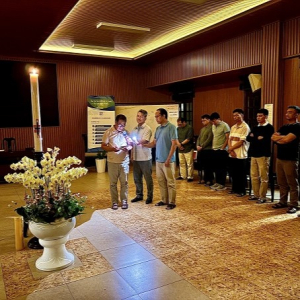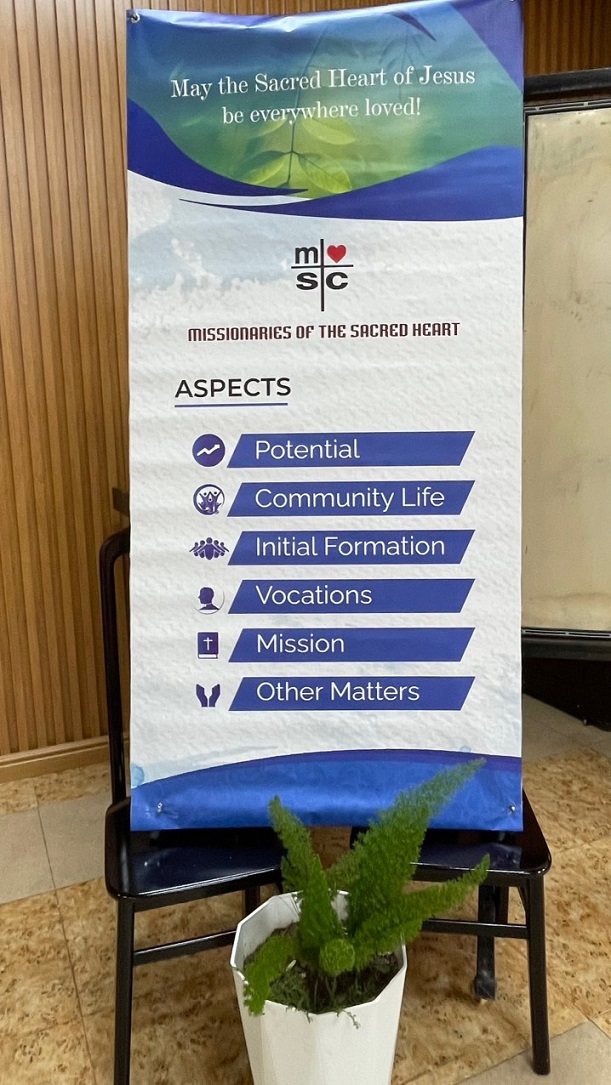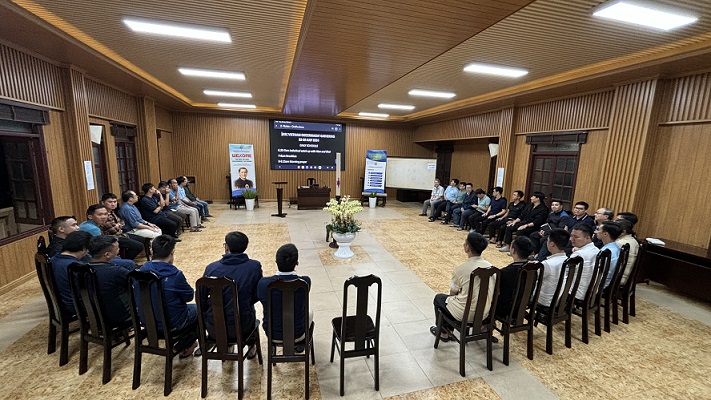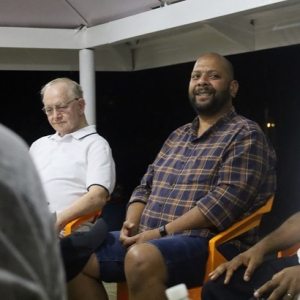Peter MALONE
Non Sono un Assassino/ I'm Not a Killer
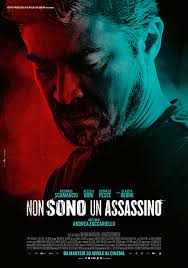
NON SONO UN ASSASSINO/I ‘M NOT A KILLER
Italy, 2019, 110 minutes, Colour.
Riccardo Scamarcio, Alessio Boni, Edoardo Pesce, Claudia Gravini.
Directed by Andrea Zaccariello.
A strong and complex Italian drama about a policeman who has served 20 years and is arrested for the murder of his longtime friend and police chief. Film opens with a phone call, the friend reaching out to the policeman after two years, wanting to consult him about a case.
The circumstances of the killing immediately implicate the policeman, an old man working on a cactus observing him, his car being seen leaving the scene, the precision of the time and movements. The policeman is arrested.
The structure of the film is quite complex, the main action taking place in the present but continued flashbacks to the relationship between the two men and their other friend, a lawyer, now being asked by the policeman to defend him. And the screenplay puts strong emphasis on the prosecuting judge, her determination in the case, and her assistant who has a past history of conflict with the accused policeman.
And in the flashbacks, the audience is taken back to young men and their meeting, their friendship, their ambitions, and a key to a draw in the murdered man’s desk, passing from one to the other, in the hope that no one will open the drawer – but, eventually the draw is opened and a message about selling one’s soul to the devil revealed.
There are complications about relationships, the accused policeman being something of a womaniser, his relationship with his ex-wife, with his daughter and her presence during the trial. The lawyer gets some advice, goes to the scene, takes photos of possible line of vision from the cactus plantation to the murdered man’s house, important for the credibility of the witness.
There are Mafia connections and background and, a twist that many might have anticipated bringing the film to a sombre conclusion.
- The title and expectations? Crime, the arrest, the investigation, the trial, the verdict? The aftermath?
- The background of the Mafia, police corruption, judges and assassinations, power behind the scenes?
- The Italian cities, police precincts, the courts, homes, holiday locations, the coast? The musical score?
- The opening, Francesco, the Asian resort? The structure of the film, the sequences in the present, the phone call, Francesco’s reaction, driving, meeting his friend, leaving, news of the death? The arrest, the Judge and her assistant and reactions? The interrogations, the witness, Giorgio as the lawyer, his background, just go in jail, the focal at the airport, the professor, the contact with the prisoner, the characters, Giorgio and his investigations, the photos, the testimony in court, the verdict? Francesco and his protests of innocence? His relationship with his ex-wife, former companions, his daughter?
- The structure of the film, the range of flashbacks, building up a picture of the three friends, University, their meetings, Georgio and his not being left anything by his father in America, Giovanni and his serious approach, their meetings, sharing, music? The issue of the key, never to be opened, passing from one to the other? Their careers, Francesco and 20 years of police work, Giovanni as a judge? Giorgio, attracted to Alice, drinking, wanting to be a singer? Their all coming together with the crime?
- The judge, her determination, confrontations with Francesco, his responses? Michele, their working together in the past, Michele and his grudges, criticising Francesco, Francesco answering back? The speeches in the court, the new evidence of the photos, losing the case?
- Francesco, the scenes with his wife and daughter, his dalliances with the other women, the underaged escort, her coming to the door and exerting pressure? Francesco and his reputation with women, with Alice? The friendship with Giovanni over the years, but leaving his office, no contact for two years? Making friends again with Georgio, relying on him in the court case?
- Issues of police corruption, the final flashbacks, Francesco and the dossier on him, shooting Giovanni, taking the photo, opening the drawer and finding the message about selling oneself to the devil?
- Georgio and rehabilitation, his letter to Alice, her coming to him? Francesco’s former wife coming to the door – an open question?
- Francesco, in Asia, the life of luxury, his visit to the Mafia chief, warned to disappear?
Goyo
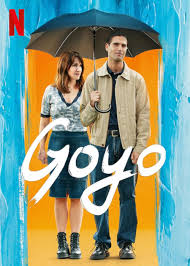
GOYO
Argentina, 2024, 106 minutes, Colour.
Nicolas Furtado, Nancy Duplaa, Soledad Villamil, Pablo Rago, Diego Alonso, Cecilia Roth.
Directed by Marcos Carnevale.
Goyo, short for Gregorio, is an Argentinian man who has Asperger’s Syndrome. In fact, there have been quite a number of films about children and adults on the spectrum. It is worth googling movies about Asperger’s Syndrome and see the significant number of films, many of them well-known.
Goyo has a sad past history, his father killed in the drink-driving accident, his mother abandoning him. He lives with his sister, strict, snobbish, a concert pianist, and with his more genial brother who is a chef. The sister tries to protect him. His brother is a great support and friend.
But Goyo has a PhD, is an expert in art, and is a guide at the Museum. He is very knowledgeable, exact in his references to times and dates and other aspects of the spectrum. Nicolas Furtado gives a strong performance as Goyo. Nancy Duplaa is very sympathetic as the older woman.
The screenplay focuses on issues of sexuality and relationships. Goyo is infatuated with an older woman whom he sees struggling in the rain with an umbrella, sees her working at the Museum, follows her, which she interprets as a stalking, but with the help of words given to him by his brother, he approaches her, apologises, and the situation is rectified. The woman herself has a violent husband just getting out of prison, two sons.
While the focus is on the woman and her age and response to the relationship, the focus is very much on Goyo and issues of sexuality, his adult longings, his encyclopedic study of pornography, the encounter with the woman and its consequences. With the pressures from his family and a violent confrontation with the woman’s husband, he becomes a confused, almost being killed by traffic in the street.
The film evokes audience sympathy for Goyo, offers the audience an opportunity to understand him in the way deaths of thinking and feeling by those with Asperger’s Syndrome..
- Goyo, Gregorio, the focus of the film, character, Personality, Spectrum, Asperges?
- Setting in Argentina, universal story? Audience interest in the theme, characters on the spectrum, the increase of diagnosis of autism and the spectrum?
- Nicolas Furtado and his performance as Goyo? His place in the family, the death of his father when he was young, drunk, his mother and her drinking, the driving, the accident? His mother withdrawing, not knowing how to relate to her son? At home with his stepsister and her strictness, at home with his stepbrother and his kindness? The routines at home, the meals, discussions? Being protective of Goyo?
- Goyo and his education, his PhD, knowledge of art history? Encyclopedic knowledge, precision of expression, accuracy of dates, dates times and places, his love of art, his room and the paintings, van Gogh, his own painting, imagining people as centres of paintings? His imagination, whirling images?
- His work at the Gallery, friendship with the staff, their understanding him, his tours and explanations for the visitors? His glimpse of Eva, his referring to her by her full name? The attraction, seeing her in the rain and frustration with the umbrella? At the Gallery? The subway, her anxiety in the train, the train stopping, the blackout, his fall, panic attack, leaving the train, on the platform, her giving him the finger? And his research online to understand the meaning of giving the finger?
- Saula and her skill as a musician, music practice, older, controlling Goyo? Matute, younger, work as a chef, the meals at home, listening to Goyo, giving him advice, the speech to make to Either? At the hospital, her being apprehensive, the explanations, her response?
- Eva and her home life, her husband in jail, the violence, the older son and his surliness, football, staying with his girlfriend, yet returning to support his mother? The younger boy, friendly, encountering Goyo, the bonding, the talk, welcoming him to the home?
- Goyo, the invitation to Eva, going out, the conversation, awkward, her response, being affirmed, drinking, the dancing, the return home, the sexual encounter, the aftermath, for Goyo, for Eva, the discussions?
- Audience response to his being on the spectrum, his manner, his friendliness? Making allowances? His concern about sexual issues, looking at the pornography, the range and encyclopedic response? The personal issues, the moral issues, his reflections? Matute and his advice?
- This purges and emotions, the effect of the relationship, at the football matches and his feeling that his brother was ignoring him?
- The continued relationship, going to his sister’s performance, her demands, judgements on Eva, the impact on Goyo, bewilderment, going to the street, the swirling vision, hospital?
- The sister and the discussions at the hospital with Eva, the rash judgement?
- Goya, seeking out Eva’s husband, the confrontation at the market, the violence?
- The family, leaving Goyo to make his own decisions? Eva and her response, love, despite the age difference, the emotional difference?
Svaniti nella Notte/ Vanished into the Night
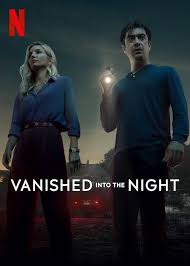
VANISHED INTO THE NIGHT/ SVANITI NELLA NOTTE
Italy, 2024, 92 minutes, Colour.
Riccardo Scamarcio, Annabelle Wallis, Massimiliano Gallo, Gaia Coletti, Lorenzo Ferrante..
Directed by Renato de Maria.
The Italian title of this thriller indicates that children vanished during the night – but the English title is somewhat evocative, that they vanished into the night.
The film focuses on a couple, long married, he Italian and something of a gambler, she American with medical and psychological qualifications. But, there are in process of divorce. They are both devoted to their children.
While the children are with their father for an evening, they disappear. He is frantic, receives a ransom note, confers with his wife, agrees to do a job for a long time friend who is a drug dealer, sailing his boat across to the Greek coast, collecting the drugs. On the way back, his engine gives out, the Coast Guard help him, and he rushes to meet the deadline for the ransom money.
But, there is a significant twist in what actually happened about the kidnapping, the children appearing and reacting quite normally when their father returns.
Brief, good performances from the leads, and an interesting twist (which, of course, some might have anticipated).
- The title, the Italian indicating “during the night”? The English indicating disappearance “into the night”?
- The Italian setting, the vistas of the city of Bari, the city centre, homes and streets, the coast, the Adriatic, the Greek coast and restaurant? The musical score?
- The mystery of the disappearance of the children? Suspects? Ransom? Audiences mystified – receiving what had happened?
- Marriage, the background, her medical qualifications, psychological qualifications? American? The marriage to Pietro, Italian, his gambling? The two children, their care for them?
- The divorce proceedings, bitter elements, custody issues?
- The sequences of each parent with the children, love for the children, the children and their liveliness?
- The children with their father, spending the night, his watching the football, the disappearance, his search, desperate, his wife, her arrival? Her anger with him? The ransom note, €150,000 asked?
- The friendship with Nicola, suspicious? Pietro and his going to Nicola, the arrangement for the money, the promise, his having to sail to Greece, the restaurant, the advice, the drugs, bring them back, the cash?
- The voyage, the restaurant, the kindly waiter, no contact, the boat, the two men, the drugs, checking the sale, giving the cash? Pietro hiding it? Going back to Italy, the engine failure, the Coast Guard, their arrival, fixing the boat, accompanying the boat? Pietro desperate, the phone calls, running, the bus, to Nicola, his being drunk, crowded, his taunting Pietro? The fight, giving him the money?
- Pietro returning home, the capture case in the toilet, his suspicions, confronting his wife?
- Her plan, drugging the children, returning them, her plan for the divorce, for custody in America? The confrontation at the airport, his threats, the reaction of the children? His taking them back home – and his wife reappearing? A future?
Longlegs
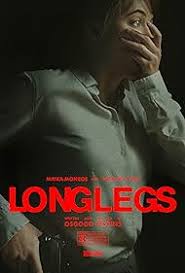
LONGLEGS
US, 2024, 101 minutes, Colour.
Maika Monroe, Nicholas Cage, Blair Underwood, Alicia Witt, Michelle Choi-Lee.
Directed by Oz Perkins.
Longlegs was an immediate success on its release, very much spurred on by clever marketing, advertising the film starring Nicolas Cage but no images of him. For many bloggers, the marketing and promotion seems to have backfired for them, one not finding Longlegs as striking as hyped and hoped for. But, many, like this reviewer, find Longlegs very effective in what it sets out to do and its effect on its audience.
Basically, this is an FBI investigation film, Maika Mnroe as Lee Harker, a young agent, invited in to investigate the death of a family, the suicide of the father after killing his family. She seems to have some kind of clairvoyant power and is given the files of previous similar murders occurring over some time and is able to make all kinds of connections. She is working with an FBI chief, played by Blair Underwood, who relies on her conclusions.
However, the opening of the film, a car driving through the countryside, a little girl inside a house with a camera, going out to look at the visitor who does not get out of the car, then encountering a strange character tantalising and menacing at the same time. The audience gets a partial glimpse of Longlegs, leaving the full visuals until the second part of the film. Longlegs is played by Nicolas Cage who has played is fair share of manic characters. This one must be near the top of the list.
The screenplay by writer-director, Oz Perkins (son of Anthony Perkins, horror-menace influence) introduces the touch of the supernatural, Longlegs being a Satan worshipper.
Lee Harker is very serious about her role with the FBI and her investigations, her powers enabling her to decode strange letters in messages left by Longlegs, to work out his motivation, to lead to his arrest. But, she has her own difficulties in her relationship with her mother. And this will be integral to the development of the narrative.
While there are some very eerie moments, a sense of menace, the advantage of the screenplay is that there is, eventually, a coherent explanation of each of the characters, their interactions, the influences, leading to a dramatic finale that may or may not bring Longlegs’ activities and influence to a close. (And a recommendation that the film is best seen in the darkened cinema.)
- The title, the central character? Serial killer? Satan worship? Investigation?
- The settings, the 1970s to the 1990s, rural America, the American town, the FBI headquarters, homes, the countryside? The musical score?
- The prologue, the little girl, watching out the window, the car in the countryside, the occupant not getting out, her going out, the confrontation with Longlegs, her mother?
- Lee Harker, her background, phone calls with her mother, her mother’s erratic responses? As an FBI agent? Present at cases, viewing bodies? Her powers, making connections, being given the range of cases, the files, family deaths, the father killing the families, the letters, the lettering, the signature of Longlegs? The room, her rearranging the files, insights? Deciphering the code? The messages? The focus on the girls’ 9th birthdays on the six days surrounding the birthday? Working out the triangle, the missing date? The mystery of the identity of Longlegs? Speculation about his using an assistant?
- Agent Carter, working with Lee Harker, his limitations, relying on her, the visits to families, the family and decaying bodies, his reaction? His own family, wife and daughter, friendly with Lee Harker, her visit?
- The searching the house, the finding of the doll, the mysterious substance and its effect? Lee Harker and the finding of her mother’s photos, identifying Longlegs, his arrest, standing at the bus stop, the visuals of Longlegs, voice, face, white-mask, hair, sinister, satanic? At the bus stop, waiting for the arrest? The interrogation?
- Longlegs as a dollmaker, in the basement, the gifts for the girls, the doll of Lee Harker?
- Lee Harker, lonely, in her house, the desk, sinister sense of presence? Her mother’s calls?
- Longlegs, motivation, behaviour, the killings, the doors of the paper, the murderous father and suicide? Longlegs being uncovered, the issue of an assistant, living downstairs, bashing his head, his death?
- Lee Harker visiting her mother, with her associate, the mother killing the associate? The doll, its effect on her, her mother as the assistant? Her bargain with Longlegs to do his work, a Faustian pact?
- The visuals, the mother dressing as a nun, bringing the dolls, received into homes, the deadly effect?
- Agent Carter, his family, his daughter’s birthday, Lee Harker hurrying, the doll, the little girl attached, the behaviour of Carter, killing his wife in the kitchen, threatening his daughter, Lee Harker’s reaction, saving the little girl?
- But…? The attempt to shoot the doll, no bullets, the voice singing happy birthday?
Family Affair, A/ 2024
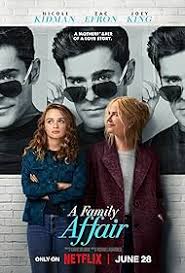
A FAMILY AFFAIR
US, 2024, 111 minutes, Colour.
Nicole Kidman, Zac Efron, Joey King, Kathy Bates.
Directed by Richard La Gravanese.
A Family Affair is a romantic comedy designed for the Netflix audience. And, it was very successful.
The film was written and directed by Richard La Gravanese, longtime screenwriter and director. But the film relies on the impact of its stars, their reputations, bringing them together. And, especially, with the age difference between the actors and their characters in the film, a May-December romance.
At the same time, another film made for streaming, The Idea of You, starred Anne Hathaway and Nicholas Gallantzine, a much more serious take on the relationship, and the criticisms and judgements about the older woman was very successful.
This film has a Hollywood setting. Zac Efron, partly sending up his own image and career, is probably the most callow and self-absorbed film star, working in a superhero franchise, worried about his career, and the quality of the writing – though he is in no place to judge. He is a person of selfish whims, his production assistant having to fulfil all his wishes, and is phone calls at all times of the night, go to buy some food that he decides he wants. The production assistant is played by Joey King.
After the star dismisses his assistant, he goes to her house to ask her to come back and encounters Nicole Kidman as her mother, the widow of many years, an award-winning writer. Perhaps audiences will be taken aback by the swift sexual encounter but this does then become the theme and debating point of the film, the daughter taken aback, warning her mother, finding the actor giving his mother for gift of hearings, a sure sign in the past that he was breaking with a woman. This breaks up the relationship.
One of the advantages of the film is the genial mother-in-law played by Kathy Bates, a good influence on all the characters.
Of course, the daughter relents, the relationship takes up again – and seems to be successful, the mother even working on the screenplays for the films…
- The title, variation on the theme? Romantic comedy? A May-December story?
- The Hollywood setting, studios, actors, agents, assistants? The musical score?
- The focus on the Zara, her age, working with Chris, doing all the work, his taking her for granted, the menial jobs, the issue of rewrites, his whims, her responding, his offhand attitude towards her, changing codes…? Her giving up on him? Her life, her friendships? Her relationship with her mother, memories of the dead father, idealising him?
- Zac Efron, his image from his young days, now middle-aged? The movie star, his whims, tantrums, unreasonable demands on Zara, his attitude towards his characters, the franchise, wanting rewrites, his relationships, with women, breaking up with them, the eeriness and the tour…? A completely callow character?
- Nicole Kidman as Brooke, her age, widow, writer, award-winning, successful, missing her husband? Her relationship with her daughter, supporting her ambitions? Critical of Chris?
- Chris, the visit, meeting Brooke, the reactions, the speed of the sexual encounter, Zara coming home, her reaction to Chris, to her mother? Warning her mother?
- Leila, mother-in-law, friendly and genial, supportive, the visit at Christmas, her urging Brooke to feel free, urging Zara to be tolerant? Her reaction to Chris?
- Chris, wanting to employ Zara again, relying on her?
- The happy couple, together, the dinners, talk, age difference, difference in character and temperament? Zara, her warnings, seeing the gift of the earrings and remembering these is the brush off, and the tour of the studio? Warning her mother, her mother upset?
- Zara, her reactions, her friend, talking things over, her harsh and brash breaking up of the relationship, going to her mother, apologising?
- 12 months later, happy endings, Zara and her being a producer, Brooke and Chris and the relationship?
- A fluffy romantic comedy with the emphasis on the age difference?
Glorias, The
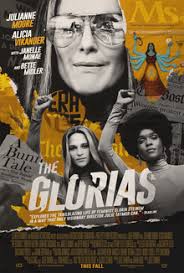
THE GLORIAS
US, 2020, 147 minutes, Colour.
Julianne Moore, Alicia Vikander, Ryan Keira Armstrong, Lulu Wilson, Gloria Steinem, Timothy Hutton, Enid Graham, Bette Midler, Janelle Monae.
Directed by Julie Taymor.
The Glorias is a portrait-biography of feminist Gloria Steinem. It has been written and directed by Julie Taymor, a renowned theatre director, Tony awards for The Lion King, various Shakespeare productions. Her film career includes Shakespeare’s Titus, the biography of Frida Kahlo, Frida, the musical, Across the Universe.
On the one hand, the overall impact of the film provides a continuous biography of Gloria Steinem, her origins, her travelling father, the mental illness of her mother who had been a journalist writing under a male byline, the disturbing early years of her childhood, her getting a scholarship to travel in India as a young adult, her ambitions as a journalist, difficulties in a male-only publishing world, exposure to exploitation in Playboy clubs and writing on this, but her going to the March on Washington for a portrait of James Baldwin, encountering a number of black women, forming friendships with them, beginning to write, the establishing of the magazine Ms and the status of the title for women and its acceptance, participation in elections for Congress, friendship with Bella Absent, the passing of the years and her campaigning into the 21st-century.
However, there is something of a surreal framework for this biography. A device is used, with black-and-white photography also, of the four actors portraying Gloria Steinem travelling on the bus, discussions with each other about issues, Gloria talking to herself, examining her past, in the past coming alive in the colourful flashbacks. The main focus on Gloria Steinem is in Julianne Moore, but also Lulu Wilson as the little girl, Ryan Keira Armstrong as the adolescent with conventional ambitions but then breaking out and the young adult Gloria played by Alicia Vikander. Timothy Hutton plays her father. Janelle Monae is one of her close friends and allies and there is a tour-de-force performance by Bette Midler as Bella Abzug.
The film recreates the period, immersing audiences in the various decades of the 20th century, changes in politics, social attitudes, the rise of feminism.
An interesting different view on the feminist years can be seen in the television series, Mrs America, Rose Byrne playing Gloria Steinem, the focus on her opponent, Phyllis Schlafly, played by Cate Blanchett.
- The title, the focus on Gloria Steinem, from her autobiography, My Life on the Road, the actresses portraying Gloria Steinem, the final sequences with Gloria Steinem herself?
- The rise of feminism in the 20th century, in the United States, the key personalities, the role of Gloria Steinem, journalist, international experiences, speaker, civil rights, abortion issues, women’s rights, multiracial campaigning, politics, the variety of associates, the buildup of her speaking engagements, opposition, personal life, the achievement?
- The structure of the film, actresses, different stages, their being seen together, on the bus, conversations, interactions, the younger with the older Gloria remembering, questions? The effect of flashbacks and flashforwards? And, finally, footage of Gloria Steinem herself?
- Gloria Steinem in her time, her mother, journalist, breakdown, institutions, her support of her mother? The divorce, her devotion to her father, caravan, the travels, his dealing in antiques, internationally? His illness, her travelling to him? The phone call sequence? The bonding with her parents, the visits to her mother, her mother’s encouragement?
- Her growing up in Ohio, the travels, the 1940s and 1950s? The actress playing the young Gloria, the curiosity, her parents, and the sequences with the young Gloria and the older Gloria?
- The teenage Gloria, the sequence of her conventional expectations of life? And her appearing with the older Glorias, the discussions? The teenage Gloria seen as taking strong stances in the later decades?
- The adult Gloria, the sequences in India, and the later explanations her grant and travels, her interactions with the Indian women, their expectation she should be married, the conversations, the friendship? Drawing on her Indian experience in her career?
- The revelation that she had an abortion, the visit to the doctor in London, abortion as illegal, that he not mention her name, that she live her life? (Her dedication of her autobiography to him and this quotation?)
- Her attempts at journalism, the reaction of the editors, males, writes and rewrites, topics? The struggle, her wanting independence? The later meetings, the idea of their magazine, Ms, the discussions, the cover, the issues, expectations, adventurous attitudes, cautious attitudes, the publication, the results, the glimpse of women reading the magazine, the sequence of the interview with Nixon and the issue of titles, the establishment of Ms and its use?
- The Civil Rights movement, her going to Washington, the march beyond expectations, Mahalia Jackson singing, the discussions, the discussions with the African-American women? And the later saying that after civil rights, women’s rights?
- The range of associates, in the women’s movement, the importance of Dorothy Pitman Hughes, her presence, demonstrations, ideas, interactions with Gloria? Politics and the significance of Bella abs (and Bette Midler’s larger-than-life performance)? The meetings, the issues, the absolute and her declarations? Attitudes of Betty Friedan?
- The older Gloria, Gloria from the 1970s, a long career, stances, the issues, civil rights, the attitudes towards abortion, abortion rights, campaigns? Women and their careers? Relationships? The older Gloria in the bus, and the discussions with the other Glorias?
- The final sequences? Film clips of the actual Gloria Steinem? The background of her campaigning from the 1970s to the 2010s?
- The changes in American feminism over the decades? Developments by the 21st-century? The continued challenges in the present and into the future?
Good Mother, The/ 2023
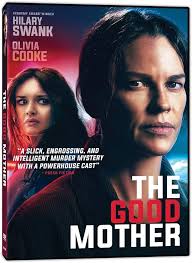
THE GOOD MOTHER
US, 2023, 90 minutes, Colour.
Hilary Swank, Olivia Cooke, Jack Reynor, Dilone, Norm Lewis, Madison Harrison, Hopper Penn, Karen Aldridge.
Directed by Miles Joris-Peyrafitte.
The Good Mother is a brief drama, set in Albany, the city not usually seen in American movies but here an impression of the vistas of the city, the buildings, the freeways, the neighbourhoods.
The title refers to Marissa, played by Hilary Swank, a journalist who has suffered the death of her husband, grief and drink. At the opening, we see the killing of a man jogging in the streets, the news coming to Marissa from her policeman son, Toby (Jack Reynor). At the funeral, she is very hostile to her son’s girlfriend, hitting her, but then apologising – and a bond growing up between the two women. Which means that the title could refer to the young woman, Paige, played by Olivia Cooke. Interestingly, Jack Reynor and Olivia Cooke are both British.
The women decide to follow some leads to see who was responsible for the killing, the dead son being an addict and dealer – though Paige asserts that they were off the drugs.
There is a strong sequence where Paige and Marissa go to a group discussion – and a highlight is a speech given by Karen Aldridge as Laurie, the children, addicts, their deaths.
There is a further complications, Paige discovering some drugs in her old house, Marissa pursuing her sons collaborator and his attacking her, aged Marissa interviewing a witness to the death and getting some clues, Paige with the phone number of the contact who set up the killing.
The narrative the film does not develop as we might have liked, harsh complications, harsh challenges some violence and sadness.
Which means that the screenplay combines familiar material but some unexpected plot developments.
- The title? True, ironic? For Marissa, for Paige, for the grandchild?
- The city of Albany, the views of the city, streets, buildings, freeways, homes, dangerous neighbourhoods, press office, trains, the railyard? The musical score?
- The opening, tension, the runner, the pursuing lights, his death? The transition to Marissa, waking up, her drinking, going to the office, Toby coming with the news, her grief?
- The background stories, the discussions and memories, the videos of Michael playing baseball, a good little boy, his talent, his shoulder injury, the drugs? Addicted, dealing? The long friendship with Ducky? Toby and his ambitions, the older brother, becoming a policeman? Marissa and the death of her husband, her grief, her drinking, going to group discussions? Toby and his advice, playing pool with her, urging him not to drink?
- The funeral, Marissa’s grief, Paige present, Marissa and the attack, hitting her, the apology, their being together? Her dislike of Paige, Paige and her love for Michael, pregnant? The past friendship with Ducky, addictions in dealing, changing? Michael and his phone message, a change, buying a house? This leading to the bonding between Paige and Marissa, and the friendship with Gina, her pregnancy?
- Marissa, going to back to work, her skill in writing, the editor urging her to write? With Paige, going to the meeting? Laurie and the cameo of her speech to the group, key revelation about feelings, children, addiction, care of children, taking Marissa to the safe injections centre? Her seeing Ducky, chasing him, his hitting her? Coming home, telling Toby, his saying he would handle it?
- When did audiences become suspicious of Toby? Performance, body language, facial expressions? Suspicious?
- Paige, going to the old house, finding the suitcase, the drugs? And the explanation of the drugs, femme fatale and cocaine? Causing deaths? Her escaping after the pursuit? Going to see Ducky, dead? Hiding the drugs in Marissa’s house? Marissa discovering them?
- Taking refuge in Toby’s house, with Ducky’s phone, the mysterious call that lured Michael to his death? The information about the tower to underhand, the driver? Marissa and Paige visiting the old man who witnessed the episode?
- Ringing the phone, Toby’s phone ringing, going to the basement, Toby confronting her, her fall, to the hospital, the birth, her death? Marissa taking the baby?
- Marissa, suspicions of Toby, following him in the car, the train, the drugs to the man with a tattooed on the hand?
- Marissa and her care of the baby, starting to write the story, giving it to the editor?
- The open end, the document, the cigarette and her never lighting up, lighting up the lighter – to smoke or to burn the manuscript? The audience to decide what she would do, what they would do?
Opening Ritual 23 July 2024 - MSC VN Gathering
Opening Ritual 23 July 2024 - MSC VN Gathering
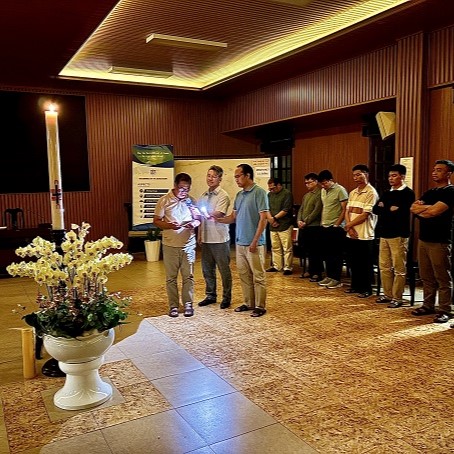
It was a wonderful time for the MSC Vietnam to gather on the night of 23 July at K'Long Don Bosco Centre
to commence their discernment together with a ritual in which Bob Irwin, who was the Australian Provincial when the Australian MSC decided to come and begin the mission in Vietnam, brought in the light into the midst of the gathering.
The light was in turn passed on to each community member. Finally it was passed on to Thoi Tran, who has significantly contributed in the development of the mission for the first twenty years.
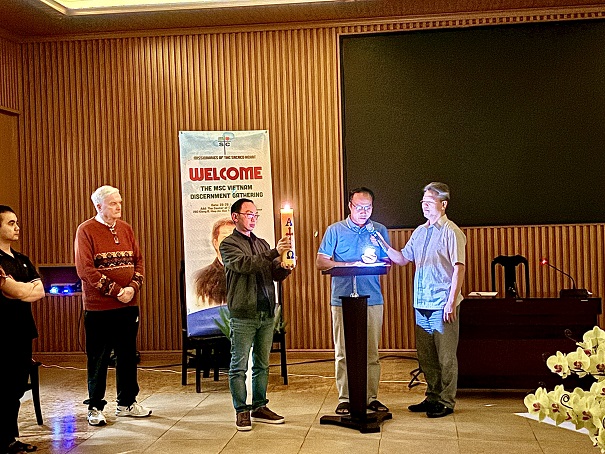
He is now representing the Provincial, Stephen Hackett, in his turn lit the discernment candle of the community.
Gene Pejo, on behalf of the Superior General, said a prayer and conferred a blessing on the community to conclude the opening ritual.
Appreciation to Bang Dinh MSC for text and photos.
Australian Province delegation for Simon Mani's Episcopal Ordination
Australian Province delegation for Simon Mani's Episcopal Ordination
Steve Dives and Kimi Vunivesilevu
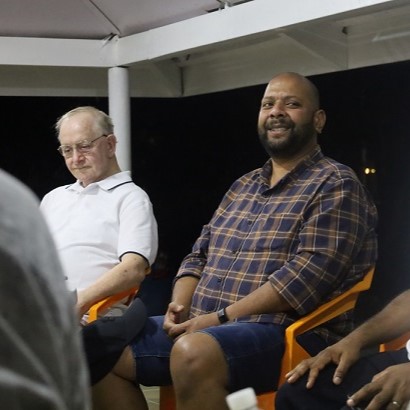
Thanks to shared photos from Martin Everi MSC

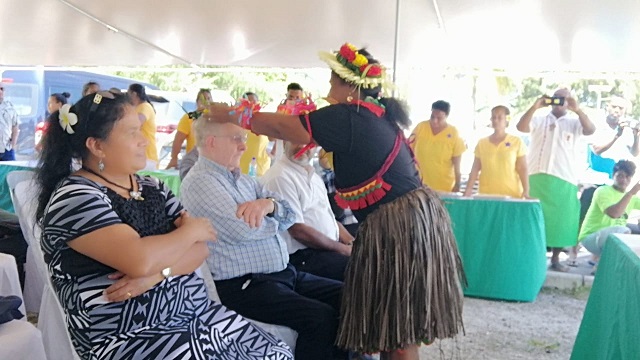
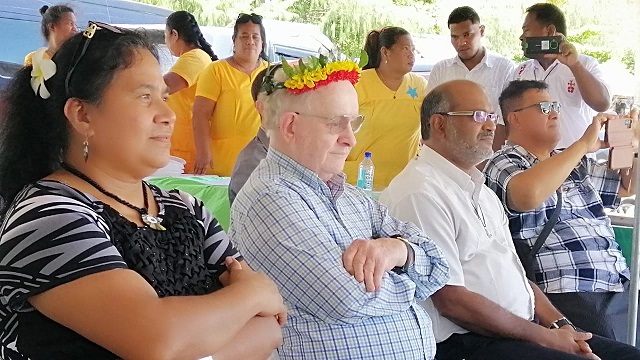



Stormskerry Maja
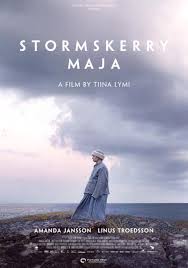
STORMSKERRY MAJA
Finland, 2024, 169 minutes, Colour.
Amanda Jansson, Linus Troedsson.
Directed by Tiina Lymi.
Stormskerry Maja is based on a series of Finnish books, focusing on life in Finland in the middle of the 19th century. For audiences unfamiliar with the Scandinavian way of life, this is an interesting and moving invitation to appreciate this world.
The running time of the film is quite lengthy, based on a series of books, the kind of material that could be portrayed in a miniseries.
The audience is taken to a remote village, and extended family, their way of life, religious beliefs, a strong emphasis on local traditions and superstitions, especially about the city, but also the question believes, language and practice.
The focus of the film is on a younger daughter, at first seeming rather a simple soul, playful with her older sister, devout, religiously superstitious, obedient to family in the style of the times. When a young man arrives and his father proposes a marriage, this automatically follows.
But, as the title indicates, Maja is at the centre of this lengthy story which takes place over several decades. Amanda Jansson grows on the audience, as she grows in age and maturity over the times. Visually, she seems ageless, a consistency throughout her long life – glimpsed only at the end as aged.
The audience wonders how she will deal with marriage, isolated and simple as she is, but, her husband, Janne, is a kind and considerate man and the union blossoms into an absolute love and devotion, one of the most persuasive portrayals of consistent and long love in the film.
The film shows their way of life, Maja’s pregnancy, the joy of the birth of their daughter, later several children, bringing up the children, the older girl learning to read and write, the fishing, the ambitions to build a better boat, a simple life and simple love.
There is a dramatic interruption with the outbreak of the Crimean War and British warships and sailors stationed on the island, Janne having to escape the conscription. Which means that there is a variation in the sequences, Maja and the children coping with the occupation, the language barriers, the threats from some of the soldiers to kill the cow for food, but his rebuffed by the authorities and flogged. And, there is set scenes when the sailors returned from battle, many dead, and Maja attending to the wounded.
As the film nears its final part, there is both joy and, as we might have expected, sadness. But, from it all, Maja emerges as a very strong woman, able to take responsibility, rejecting the offers of support from the family, staying, bringing up her children, a portrait strong woman.
- The title, the island off the coast of Finland, the focus on Maja and her being grounded on the island?
- A Finnish story, the 19th century, the remote communities, the way of life, the land, the sea, fishing, isolated, religious, superstitious, the importance of family? The musical score?
- The landscapes and the seascapes, the mainland and the village, homes, buildings, churches, the way of life, the work, join celebrations? The island, remote, the coast, the rocks, the hunt, the boats, the fishing?
- The focus on the family, the numbers, the several generations, father and mother, the two sisters, life together, personalities, interactions?
- The Christian traditions and prayers, church? Yet the mythologies of the Sea, the gods and powers, beliefs, prayer?
- The focus on Maja, age, her sister, her eccentricities, the superstitions, the sea? The guest arriving, his son Janne, the arrangement, the marriage, Maja and her lack of preparation, the ceremony, Janne and his personality, his consideration, gentle manner, the aftermath of the wedding, the wedding night, Maja and her reticence, Janne and his consideration, the beginning of the marriage, the beginning of love, the deepening, the couple and their commitment to each other?
- Going to the island, setting up there, the heart, Maja pregnant, the fishing, the hard work, their way of life, the joy together, leaping naked into the water, comfortable with each other, love and affection? The birth of the baby, the joy? The birth of the other children?
- Time passing, the growing family, managing their survival, the fish, hoping for merchandise and trade?
- The Crimean War, the arrival of the English, the ships, the sailors, setting up on the island, the threat to Janne, Maja, rowing him to his escape? The family missing him, the older daughter and her responsibilities, the boys, the baby?
- The personalities of the British, the commanders, the men, the ships, complaints, the issue of the car, the family depending on it, the milk, the sailors demanding that it be slaughtered for food? The rabble rouser, his advances on Maja? The discipline by the commander, the flogging? The time passing, the family surviving, communications, language barriers? The involvement in the war, the battles, the sailors coming back to the island, the wounded, the daughter and her grief for their destruction, her mother reprimanding her, the shock of the wounds of the sailors, Maja and the wounded sailor, brandishing the weapon, her controlling him, summoning his wound, his gratitude? Their finally leaving?
- The joy of Janne’s return, family life, the work, the fishing, the new baby? The plan for the merchandise, Janne getting ready, leaving, the son, August, going with him? Time passing, Maja and her pregnancy, with the children, the work, the plans for the boat, wanting the oldest child to be literate?
- The sadness of Janne’s death, August returning? The family and their concern, her father, the visits, her sister and the harsh interactions, eventually becoming playful?
- Maja, becoming more decisive, taking on responsibilities, doing the work, the boat, with her children, her roots on the island, not believing?
- The final image, Maja aged, moving out, the children, her accomplishment – and seeing the images of Janne and August? The completion of a happy and worthwhile life, a simple girl, becoming a responsible woman, and assertive and capable woman?
